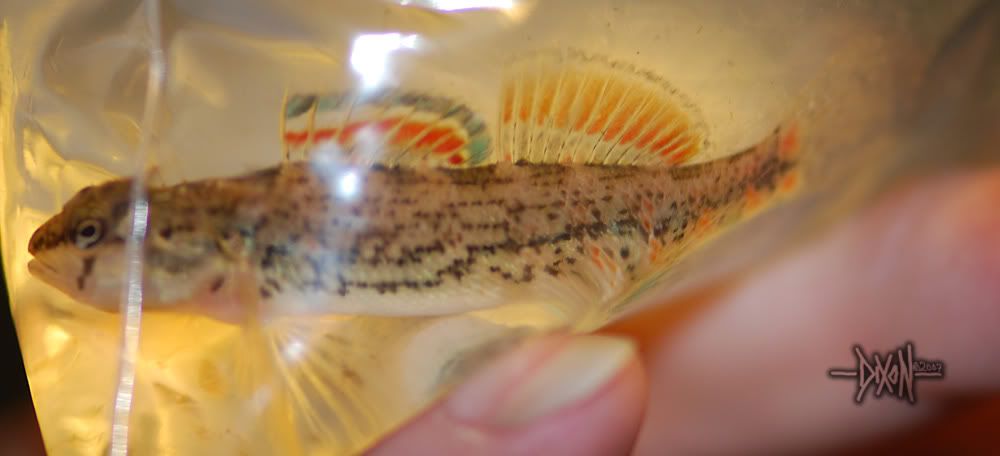
The other 3 specimens collected were similiar in markings, but no where near the color. I am guessing my other fish are females. Higher quality pics to come as the fish get settled into their new home.
Posted 13 November 2007 - 02:17 PM

Posted 13 November 2007 - 04:23 PM
Posted 13 November 2007 - 04:53 PM
Looks vaguely like a gulf darter. You should probably get your fish I.D.'ed and then go collect them, as that could very well be a protected species.
Posted 13 November 2007 - 05:20 PM
Posted 13 November 2007 - 05:23 PM
It's still unethical, and probably illegal regardless of what a few game wardens say.I have permission to do my collecting, so even if I end up with a protected species it should not be an issue as I am keeping them for personal study and education. Worst case scenario, I will donate them to the Oklahoma Aquarium in Jenks along with my collection data.
Posted 13 November 2007 - 05:30 PM
Posted 13 November 2007 - 05:31 PM
Posted 13 November 2007 - 05:40 PM
I'll second that it is an orangethroat darter or one of the species that have been split off from orangethroat darters. There are actualy a couple others in your area, if you could give me what major drainage spring creek is in I could look up if it is an orangethroat or a newly described species.
Posted 13 November 2007 - 05:52 PM
I guess the mods didn't like it and deleted it. I guess that if I say something is unethical or illegal it gets deleted.Great write-up tglassburner.
Posted 13 November 2007 - 05:58 PM
I guess the mods didn't like it and deleted it. I guess that if I say something is unethical or illegal it gets deleted.
Posted 13 November 2007 - 06:03 PM
It's ok. I'm sorry too.Sorry about that Tom, but there was way too much copy and paste text when a link would have sufficed. I just needed a minute or two to insert the link.
Posted 13 November 2007 - 06:03 PM
It's still unethical, and probably illegal regardless of what a few game wardens say.
http://www.nanfa.org/mission.shtml
Posted 13 November 2007 - 06:08 PM
True, but protected species are protected for a reason, regardless of where they end up.So is having a large carbon footprint...but people tell us to balance it out with "carbon credits"
I'll balance my "collecting footprint" out with some "Asian carp credits" ...carp eat darters...I'll kill a few dozen invasive carp for every fish I collect. Now don't talk to me about ethics, I'm trying to be as ethical as possible and go through my local fisheries biologists and fish and game agency. Again...worst case scenario is that a public aquarium gets them and all my collection data. ^_^
Posted 13 November 2007 - 06:14 PM
Posted 13 November 2007 - 06:16 PM
What is the "AFS book"?Well there are actually 2 in that area one of which there is no location for it's occurance given in the latest addition of the AFS book Etheostoma uniporum. I gotta go for today but feel free to look that up and see if you can find a range for it. The other is in the Strawberry River Drainage and is called E. fragi. Those look like they are the only two new forms in your area so far, but who knows it could change again.
Posted 13 November 2007 - 06:17 PM
True, but protected species are protected for a reason, regardless of where they end up.
Posted 13 November 2007 - 06:22 PM
Well there are actually 2 in that area one of which there is no location for it's occurance given in the latest addition of the AFS book Etheostoma uniporum. I gotta go for today but feel free to look that up and see if you can find a range for it. The other is in the Strawberry River Drainage and is called E. fragi. Those look like they are the only two new forms in your area so far, but who knows it could change again.
Posted 13 November 2007 - 08:28 PM
Posted 13 November 2007 - 08:35 PM
Exactly what I was going to say. You beat me to it. If the fish are protected, why make a bad situation worse by taking more from their habitat?
Posted 13 November 2007 - 09:05 PM
0 members, 1 guests, 0 anonymous users